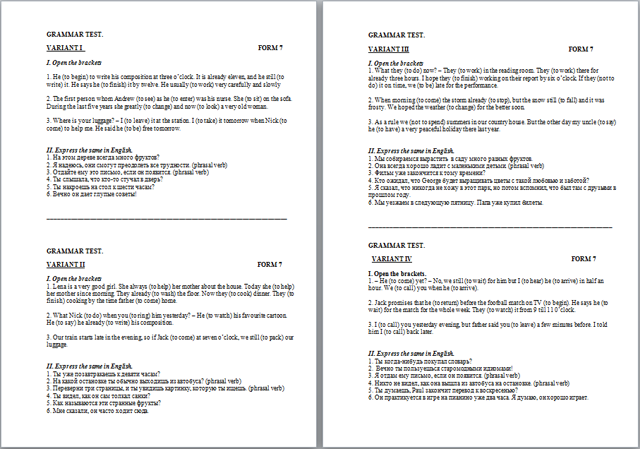Variant I.
I. Open the brackets.
1. He (to begin) to write his composition at three o’clock. It is already eleven, and he still (to write) it. He says he (to finish) it by twelve. He usually (to work) very carefully and slowly
2. The first person whom Andrew (to see) as he (to enter) was his nurse. She (to sit) on the sofa. During the last five years she greatly (to change) and now (to look) a very old woman.
3. Where is your luggage? – I (to leave) it at the station. I (to take) it tomorrow when Nick (to come) to help me. He said he (to be) free tomorrow.
II. Express the same in English.
1. На этом дереве всегда много фруктов?
2. Я надеюсь, они смогут преодолеть все трудности. (phrasal verb)
3. Отдайте ему это письмо, если он появится. (phrasal verb)
4. Ты слышала, что кто-то стучал в дверь?
5. Ты накроешь на стол к шести часам?
6. Вечно он дает глупые советы!
Variant II.
I. Open the brackets
1. Lena is a very good girl. She always (to help) her mother about the house. Today she (to help) her mother since morning. They already (to wash) the floor. Now they (to cook) dinner. They (to finish) cooking by the time father (to come) home.
2. What Nick (to do) when you (to ring) him yesterday? – He (to watch) his favourite cartoon. He (to say) he already (to write) his composition.
3. Our train starts late in the evening, so if Jack (to come) at seven o’clock, we still (to pack) our luggage.
II. Express the same in English.
1. Ты уже позавтракаешь к девяти часам?
2. На какой остановке ты обычно выходишь из автобуса? (phrasal verb)
3. Переверни три страницы, и ты увидишь картинку, которую ты ищешь. (phrasal verb)
4. Ты видел, как он сам толкал санки?
5. Как называются эти странные фрукты?
6. Мне сказали, он часто ходит сюда.

Variant III.
I. Open the brackets
1. What they (to do) now? – They (to work) in the reading room. They (to work) there for already three hours. I hope they (to finish) working on their report by six o’clock. If they (not to do) it on time, we (to be) late for the performance.
2. When morning (to come) the storm already (to stop), but the snow still (to fall) and it was frosty. We hoped the weather (to change) for the better soon.
3. As a rule we (not to spend) summers in our country house. But the other day my uncle (to say) he (to have) a very peaceful holiday there last year.
II. Express the same in English.
1. Мы собираемся вырастить в саду много разных фруктов.
2. Она всегда хорошо ладит с маленькими детьми. (phrasal verb)
3. Фильм уже закончится к тому времени?
4. Кто ожидал, что George будет выращивать цветы с такой любовью и заботой?
5. Я сказал, что никогда не хожу в этот парк, но потом вспомнил, что был там с друзьями в прошлом году.
6. Мы уезжаем в следующую пятницу. Папа уже купил билеты.
Variant IV.
I. Open the brackets.
1. – He (to come) yet? – No, we still (to wait) for him but I (to hear) he (to arrive) in half an hour. We (to call) you when he (to arrive).
2. Jack promises that he (to return) before the football match on TV (to begin). He says he (to wait) for the match for the whole week. They (to watch) it from 9 till 11 0’clock.
3. I (to call) you yesterday evening, but father said you (to leave) a few minutes before. I told him I (to call) back later.
II. Express the same in English.
1. Ты когда-нибудь покупал словарь?
2. Вечно ты пользуешься старомодными идиомами!
3. Я отдам ему письмо, если он появится. (phrasal verb)
4. Никто не видел, как она вышла из автобуса на остановке. (phrasal verb)
5. Ты думаешь, Paul закончит перевод к воскресенью?
6. Он практикуется в игре на пианино уже два часа. Я думаю, он хорошо играет.

 Получите свидетельство
Получите свидетельство Вход
Вход












 Грамматическая контрольная работа по английскому языку (30.17 КB)
Грамматическая контрольная работа по английскому языку (30.17 КB)
 0
0 1487
1487 588
588 Нравится
0
Нравится
0


